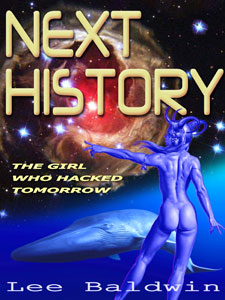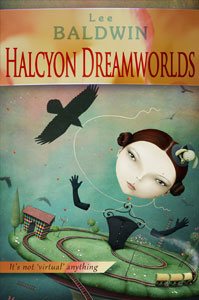The Post-Biological Universe of Lee Baldwin

Artificial intelligence, and the singularity, are with us today, in the form of rapid acceleration in fields from the technologies to artistic media. Those who realize this may still be uncertain as to what form this “singularity” will take.
Artificial Intelligence and Automation
By 2099, artificial intelligence (AI) will have permeated every aspect of life, offering both remarkable benefits and significant challenges. On one hand, AI will enhance healthcare with personalized treatment plans, improve agricultural yields to combat hunger, and offer efficient solutions for everyday tasks.
Already we sense that widespread adoption of AI may lead to job displacement, as machines outperform humans in various roles. This shift could create a social divide between those who thrive in a tech-driven economy and those left behind.
But ‘left behind’ is a negative view of a useful reality. For individuals who find themselves displaced, this transition might feel like a loss of purpose and identity. Communities will need to foster environments where people can retrain and adapt to new roles, ensuring that technological progress benefits everyone.
Biotechnology and Human Enhancement
Advancements in biotechnology will lead to groundbreaking changes in health and longevity by 2099. Diseases that once plagued humanity could become manageable or even eradicated through genetic engineering and personalized medicine.
While these innovations promise healthier lives, will such advancements be available to all, or only to those who can afford them? The potential for extended or physically-augmented human lives will create new social hierarchies based on biological advantages.
As people of 2099 navigate these developments, it is crucial to maintain empathy and ensure that technological benefits are distributed fairly.
Connectivity and Virtual Reality
Most aspects of future living will be hyper connected, using virtual reality (VR), with augmented reality (AR) transforming how we interact with the world. And who we are.
These technologies will enable immersive experiences that blur the lines between physical and digital realities. While this connectivity can foster global collaboration and understanding, it may also lead to social isolation as individuals retreat into personalized virtual worlds.
The challenge will be to balance digital engagement with real-world connections, preserving the depth of human relationships.
Environmental Technologies
By 2099, environmental technologies will play a critical role in addressing climate change and resource scarcity. The term ‘post-scarcity society’ awakens us to times in which individual people need not work for physical support of their lives. All food, consumer goods, shelter, and waste management will be freely available to all. There will be jobs to fill, for those with the intellectual and social desire to contribute their time in those ways.
Overall, new technologies will offer hope for a more sustainable future but will require collective action and cooperation across nations. As individuals, we must embrace sustainable practices in our daily lives and advocate for policies that prioritize environmental health.
Ethical Considerations
As technology continues to advance rapidly, ethical considerations will become increasingly important. The pace of technological change may outstrip our ability to develop appropriate regulations and ethical frameworks.
This gap could lead to social anxiety and political divisions as societies grapple with issues like privacy, data security, and the moral implications of AI decision-making. It is vital for individuals to engage in discussions about the ethical use of technology and advocate for policies that protect human rights. In conclusion, the social impacts of key technology trends by 2099 will be vast and varied. While these advancements hold the promise of a better future, they also present challenges that require thoughtful consideration and compassionate action. By fostering inclusive communities, advocating for equitable access to technology, and prioritizing ethical considerations, we can navigate this transformative era with empathy and ensure that technological progress enhances the human experience for all.
One goal of Russell Lee Baldwin’s breakout science fiction is to show that even with such current negative trends as smart machines taking away the human workforce, technology will be a net positive for human progress. It will not come in a single stroke. That’s in part because Baldwin’s future vision sees a community of post-biological intelligent individuals… people who are part human and part machine.
Who’s Post-Biological, Anyway?
They are here already, they are among us. They carry artificial hips, knees, hearts, and joints, which will soon give way to softer organs and then to cybernetic implants. A smarter you with more memory?
Baldwin visualizes a slowing of urbanization toward a softer footprint on the land, leading humanity to a more pastoral way of life in concert with the needs of plants, animals, and the living Earth. This author feels that such beliefs will promote the evolution of humankind. Yeah… when we can agree on what that evolution is to look like.
In Baldwin’s future worlds, humans are confident in their technology and confident about a shared intention, an intention in which high technology is not seen as having power over humankind. The much-vaunted artificial intelligence ‘Singularity,’ a near-reality in terms of technological power, will not necessarily prove out as a doomsday mentality.
But there are always villains, the friction of fiction.
What’s Coming
In Baldwin’s recent novel, Robot, Run!, set in 2099 California, some individuals prove smarter than computers. In that society, people generally regard themselves as the equal of their tools, in the same sense as today, when anyone can operate a motor vehicle or computer. In 2099 California, technology does advance, controlled by a shared sentiment about its purpose, which is to serve humankind. Like Philip K. Dick, but for much different reasons, Baldwin believes the solution to human misgivings about technology is to accept them, not as an infernal boogeyman, but as the powerful and beneficent servant of humankind. Think of is as power brakes and power steering.
Baldwin’s series of speculative fiction novels, The Catapult of Singularity (Halcyon Dreamworlds, Savage Genesis, and Robot, Run!), expresses his ideas about technology as part of human evolution toward post-biological intelligence. Here, Baldwin sees no Frankenstein, and cautions that the divide between human beings and their inventions must be kept clear. The problem is not whether androids can approximate humans, because to achieve the goals of the State the sheer cost of humanoid simulacra such as an army of androids makes that approach non-competitive when compared to virtual sex in a shared cyber-biological dream time. The question then becomes, why should we see smart machines, conscious or not, as in any way sacred, or superior?
His new series, kicked off by Savage Genesis in 2018, takes a fictional look at a mysterious past in which life is inspired on Earth by a benevolent spacefaring culture which plants designer microbes deep in the rocks of Earth. Add four billion years of heat, and voila—humanity.
Autonomous machines, possibly self-aware, perhaps conscious, do not rule out a harmonious future between biological humans and humans wedded to cybernetic abilities. Even in 2017, the definition of human is challenged and redefined by human ventures into the alternate worlds of virtual reality, simulations which become ever more realistic in the minds and bodies of the players. This vision was elaborated in Baldwin’s 2015 novel, Halcyon Dreamworlds.
In sum, Baldwin’s fictional universe relies on humans dropping all pretense to realize what they are, and accepting the assistance of smart machines, even as we today accept pacemakers and self-driving cars. The least effective way to define our human identity is to defend it as somehow special. It’s a big cosmos.




